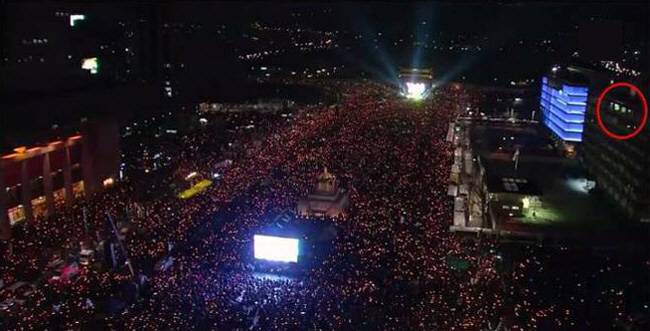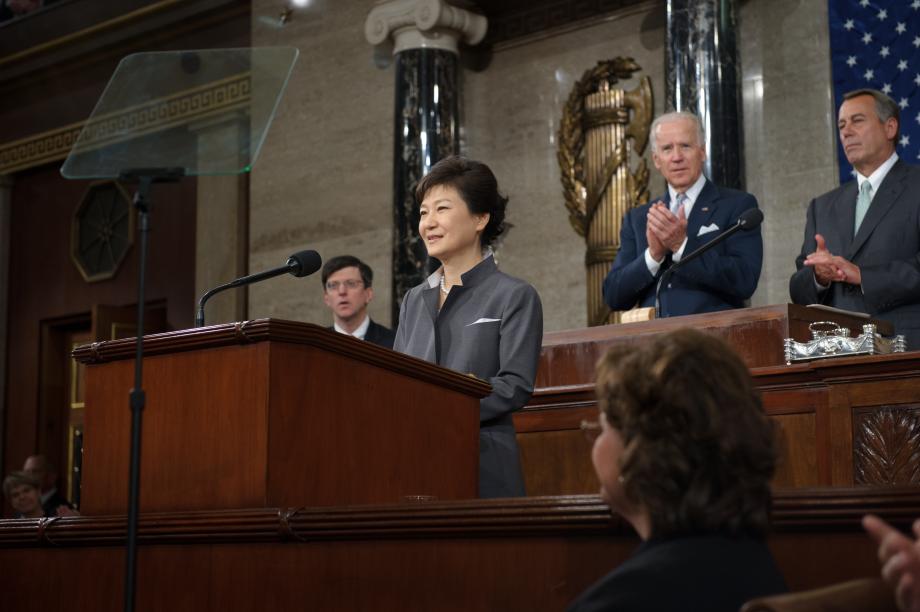Special to WorldTribune.com
 By Donald Kirk
By Donald Kirk
The many thousands of protesters who’ve been marching toward the walls of the restored palace of Korea’s dynastic kings toward the Blue House of latter-day presidents have been ignoring a likely target. That’s the American embassy, looming large, brightly lit and carefully protected by hundreds of policemen and dozens of police buses.
So far, while demonstrators hold aloft signs and banners calling for President Park’s ouster and then her trial on corruption charges, none has been shouting for U.S. forces to “get out of Korea” or accusing the U.S. of being a “co-conspirator” in her alleged crimes. Cries of “Yankee Go Home” are not heard over the mega-loudspeakers on that enormous stage beyond the golden statue of good King Sejong in the middle of the wide avenue in front of the embassy.

That’s fortunate since the protesters could easily direct their wrath against the U.S. considering how warm and friendly the bonds have been between the U.S. and Park.
Nobody seems to remember, but it was only three years and seven months ago that she gave an extremely well received address before the U.S. Congress in which she thanked the U.S. as “second to none” among “great friends” aiding Korea in war and peace.
“If the past is anything to go by” she said in a line that may be recalled with a wry grimace, “our new journey will also be filled with excitement.” Oh, how true.
The U.S. and Korea during Park’s presidency have been such great friends that Park has endorsed U.S. pleas to accept the concept of THAAD, Terminal High Altitude Area Defense.
If all goes as planned, the U.S. is to implant a $500-million-dollar missile battery, fabricated by Lockheed Martin Space Systems and a host of subcontractors including Raytheon and Boeing, on a golf course owned by Lotte. One missile, they say, is capable of shooting down an enemy missile soaring 100 kilometers above the earth’s surface.
Besides THAAD, Park has also endorsed the new agreement for Japan and South Korea to share military intelligence ― the kind of deal the U.S. has promoted for years to get these two U.S. allies to set aside generations of bitterness. “Let’s Go Together,” “Katchi Kapsida,” as U.S. commanders keep repeating, against our mutual foe, North Korea.
Park, moreover, has totally supported moves to apply pressure on North Korea to give up its nuclear and missile programs and finally come to terms.
It was Park who ordered the shutdown last year of the Kaesong Industrial Complex where more than 120 South Korean companies employed upwards of 50,000 North Koreans in small factories from which the North was said to be earning $100 million a year. And Park, through her ministers, in what may be one of her last substantive gestures as president, is all for doing more to cut off funding for North Korea with extra sanctions that are even tougher than the strengthened sanctions newly approved by the U.N. Security Council.

This recitation of all that Park has done for the U.S.-Korean alliance is not intended as commentary on her work for U.S.-Korean friendship and cooperation. The point is, Park’s bitterest foes, at the forefront of the protest against her, also are against just about every gesture Park has made to broaden the special relationship between Washington and Seoul.
The Democratic Party of Korea (DPK), the dominant force in the National Assembly against the conservative but fractured Saenuri Party, still the “ruling” party, plus two minor parties all oppose THAAD. They all would like to reopen Kaesong, and they all want to resume talks with North Korea regardless of the North’s adamant refusal to negotiate the suspension of its nuclear program.
Clearly, the U.S.-Korean relationship is in for reversals, lurches and bumps in the road in coming weeks and months as the South makes what looks like an uneasy transition from conservative to liberal or “progressive” governance.
Hopefully, American diplomats, barricaded in the embassy, and U.S. military people at the nearby Yongsan garrison and other bases know well enough to keep their mouths shut in these perilous, sensitive times. One word of support for the beleaguered president, one criticism of radical elements, could turn these “peaceful protests” into violent outbursts against the embassy, within easy range of rocks or eggs or worse flung across those police buses outside its tall walls.
Yes, it would be nice to know what the Americans think of the whole ruckus, but their silence is understandable. Nor should U.S. operatives, for whatever agency or mission, attempt to influence the outcome behind the scenes. For the Americans, the goal is not to support their good friend Park Geun-Hye in her darkest hours but to preserve the alliance.
American officials, talking to Koreans and Japanese, no doubt will sublimate their feelings for Park while striving to maintain a reasonably united front on policy toward North Korea. No matter what, they have to get along with her successor. That won’t be easy.
If ever there was a time for delicate, shrewd diplomacy plus careful, modulated inter-action between U.S. and Korean military structures, the time is now.
Donald Kirk has been covering Korean crises for decades. He’s at [email protected]
